Posted by Elena del Valle on February 18, 2011

How to Sell Anything to Anyone Anytime book cover
For many years Dave Kahle made his living as a salesperson, claiming a top sales position in the country for two companies in two totally distinct industries. Now he spends his time writing books (he has authored nine books) and sharing his insights and lessons learned with would be sales people.
In How to Sell Anything to Anyone Anytime (Career Press, $14.99), a 240-page softcover book published this year he offers his ideas for simple practices and processes, step-by-step practical tips, and suggestions he believes can help readers be more successful in sales.
The book is divided into 15 chapters covering topics such as simplifying the fundamentals of the selling process, figuring out what the customer wants, making customers comfortable, how to agree on the next step, and follow up.
Kahle believes the sales process is the same regardless of the situation and that those who learn how the process works can make it work for them no matter what they are selling or to whom. He clarifies in the Introduction that the process won’t work every time but that it should work enough times to make it worth learning.
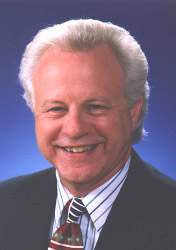
Author Dave Kahle
He says that “…selling is not magic, and there are no secrets. Instead, there are identifiable, understandable, reproducible steps in the process, which when implemented with some degree of proficiency, can be expected to lead to a positive outcome.”
After discussing many people’s ideas and misconceptions about sales he goes on to describe The Kahle Way Selling Process, a six-step process. He explains that although there are steps in the process some of the steps may take place at the same time as others and with different customers.
He emphasizes the importance of going beyond the sale and striving for a relationship. Kahle is the author of 100 multimedia training products, writes a weekly E-zine for salespeople, and has presented in 47 states and seven countries.

Click to buy How to Sell Anything to Anyone Anytime
Comments:
Filed Under: Books
Posted by Elena del Valle on February 16, 2011
Improving direct response ROI with value and cultural relevance
By Barry Gilbert
Vice president, marketing
PowerDirect Marketing

Barry Gilbert, vice president, PowerDirect Marketing
Photo: PowerDirect Marketing
According to U.S. Census data there were an estimated 46.9 million Hispanics in the U.S. in 2008, accounting for 15 percent of the nation’s total population and making people of Hispanic origin the nation’s largest ethnic or race minority. Not only is this segment increasing in number, with 2010 Census figures estimated to hit the 50 million mark, Hispanic audiences are also growing significantly in wealth and economic clout. Smart marketers are recognizing this explosive potential and turning to Hispanics for brand growth opportunities.
Sounds promising, but rest assured the Hispanic market is not a heterogeneous one that can easily be tapped. The Spanish language is a common thread, but audiences vary based on acculturation levels, language preference, country of origin, and more. Cultural relevance matters and it’s in the details such as messaging, language and creative.
Click here to read the entire article U.S. Hispanics open to front door marketing
Posted by Elena del Valle on February 15, 2011
Information provided by our Event Partner

The Billboard Latin Music Conference & Awards presented by State Farm
April 26-28, 2011 – Miami Beach, FL
Every year, the biggest names in Latin Music come together for the most anticipated event of the year.
The conference unites the most extraordinary people in the world of Latin music and entertainment – including the industry’s hottest artists, major record label execs, cutting-edge brand marketers, national radio programmers, world-renowned producers, revolutionary digital music execs – and many more. Join us as we celebrate and explore the issues that make this the most exciting industry in the world. Register Today & Save 15% with promo code HMPR11!
Confirmed Speakers Include:
Pitbull, Artist/Songwriter
Donato Poveda, Artist/Songwriter
Jorge Villamizar, Artist/SongwriterLuis Del Villar, President Del Records
Gerardo Ortiz, Artist: Del/Sony
Edmundo Mendieta, President, Mendieta Discos
Roberto Tapia, Artist, Musivisa/Universa
Carlos Boughton, Brand Director, Tecate and Tecate Light, Heineken USA
Carla Dodds, Director, Multicultural Marketing, Walmart
Roberto Garcia, Executive Director Hispanic Marketing, AT&T
Jesus Lopez, Chairman/CEO, Latin America/Iberian Peninsula Universal Music
Edmundo Mendieta, President, Mendieta Discos
Delia Orjuela, VP Latin Writer/Publisher Relations, BMI
Guillermo Page, SVP Commercial & Sales, Sony Music Latin
Steven Wolfe Pereira, SVP, Managing Director, MediaVest Multicultural
Andrew Sunnucks, Co-Founder, Audio Network
Rodrigo Paranhos Velloso, Head of Business Development, Google Latin America
Afo Verde, President, Latin region, Sony Music
And Many More! Full schedule available at: http://www.billboardevents.com/billboardevents/latin/schedule/index.jsp
Posted by Elena del Valle on February 14, 2011

A box of chocolates for Valentine’s Day
Photos: Conrad Miami
Valentine’s Day was declared in A.D. 496 by Pope Gelasius I. Although most of us know little or nothing about the pope the date has become popular as a day to express love and appreciation to those close to us. In the 1840s, a daughter of Massachusetts, is thought to be the first to sell mass-produced valentine cards. The tradition lives on with many people setting aside the day to celebrate love.
Thinking of selling a love related product or service? These figures may interest you. In 2008, 66.9 million opposite-sex couples lived together. In 2009, 2.1 million marriages (about 5,800 a day) took place in the United States; many of them in Nevada. That year 108,150 marriages took place in that arid state, making it the fifth nationally in marriages, even though its total population that year among states was 35th; California ranked first in marriages, according to the National Center for Health Statistics.
In 2010, first marriages took place at a median age of 28.2 and 26.1 years for men and women, respectively. Last year, 54.1 percent of adults responding to a national survey said they were married, according to Families and Living Arrangements: 2010.
At the same time the businesses that offer Valentine’s type products and services employ many people across several business sectors. For example, in 2008, there were 1,317 companies that produced chocolate and cocoa products (in 2009, Americans ate 23.4 pounds of candy per person, according to the Current Industrial Reports, Confectionery: 2009), employing 38,369 people. California led the nation in the number of chocolate and cocoa manufacturing establishments, with 146, followed by Pennsylvania, with 115; there were 422 establishments that manufactured non chocolate sweets products. They employed 16,860 people. California led the nation in this category, with 47 establishments, according to County Business Patterns: 2008.

The Spa at Conrad Miami is offering red rose promotions for Valentine’s Day
Beyond eatables there are many businesses that cater to love birds. Flower, cards and jewelry sellers figure prominently around this sweetheart centered holiday. The combined wholesale value of domestically produced cut flowers in 2009 for all flower-producing operations with $100,000 or more in sales was $359 million (domestic roses accounted for $18 million); again California took the lead, alone accounting for $269 million of the sales (Source: USDA National Agricultural Statistics Service). In 2008, there were 18,509 florists nationwide which employed 89,741 people, according to County Business Patterns.
In 2008, there were 26,683 jewelry stores in the United States. In February 2010, the stores sold $2.4 billion in merchandise, according to County Business Patterns.
Businesses of other types also promote romantic packages or simply Valentine’s Day themed products and services. For example, the Spa at Conrad Miami hotel in Florida is offering red rose promotions between $120 and $200. These include a 60-minute aromatherapy massage and 30-minute organic sweet red rose facial; a 30-minute aromatherapy massage and 60-minute organic sweet red rose facial; and a Champagne mimosa manicure and pedicure and 30-minute organic sweet red rose facial.
Still looking for love? In 2007, there were 393 dating service companies including internet dating services, employing 3,125 people and making $927 million in revenue (source: 2007 Economic Census).
Posted by Elena del Valle on February 11, 2011

Spend Shift book cover
John Gerzema, a social theorist on consumerism at Young & Rubicam, and Michael D’Antonio, a Pulitzer prize winning author of twelve books, believe the recession is changing people’s values. They think many people are returning to self reliance and focusing on economizing while maintaining a positive attitude.
They interviewed representatives from fifty companies in dozens of communities in eight states and share some of their findings in Spend Shift How the post-crisis values revolution is changing the way we buy, sell, and live (Jossey-Bass, $25.95), a 256-page hardcover book published in 2010.
They concluded, based on their research, that 55 percent of Americans across all walks of life, income levels, political affiliations and geographic locations have embraced this shift in spending values; and that another quarter of adults share that revised focus on values. While Millenials (those born between 1980 and 1998) are at the head of the movement surprisingly almost half of seniors favor the revised spending attitudes.
The informal movement is characterized by optimism, according to the authors. Followers are learning to live with less income while seeking, and in some cases finding, greater satisfaction and happiness than in the past.
The book includes a foreword by Philip Kotler, S.C. Johnson Distinguished Professor of International Marketing, Kellogg School of Management, Northwestern University. He indicates that more than half of our country’s population is adopting the value shifts. He says “They are seeking better instead of more, virtue instead of hype and experiences over promises”; and that “People are looking for value and values.”
The book is divided into an Introduction and eight chapters titled: The New American Frontier: Detroit, Michigan; Don’t Fence Me In: Dallas, Texas; The Badge of Awesomeness: Boston, Massachusetts; An Army of Davids: Tampa, Florida; Block Party Capitalism: Brooklyn, New York; The Quality of the Lion: Las Vegas, Nevada; The Citizen Corporation: Dearborn, Michigan; Innovation Nation: San Francisco, California; and Coda: The Takeaway: Los Angeles, California.
Two thirds of the people who responded to the authors BrandAsset Valuator said they feel they can, through their purchasing habits, have an impact on corporations; supporting companies who share their values and avoiding those with opposite values.
Gerzema, who relies on data to identify social change to prepare companies wanting to adapt to and anticipate consumer demands, is the author of The Brand Bubble. D’Antonio, formerly with Newsday, is the author of Hershey, a biography, among other titles.

Click to buy Spend Shift
Comments:
Filed Under: Books
Posted by Elena del Valle on February 9, 2011
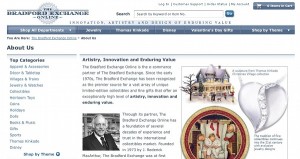
BradfordExchange.com, the most visited jewelry website
Americans hit the web with gusto this past holiday season. December 2010 saw an increase of 80 percent in retails site visits compared to the same time of year in 2009, according to comScore, Inc., a digital metrics company. According to a company spokesperson 85 percent of Americans visited an online retail site this past holiday season. Selling flowers or cards online? You probably did well in December.
The second retail category in online growth was digital seasons greetings with a 32 percent growth and 27.4 million visitors. Buyers of flowers, gifts and greetings were active during the last month of the year; 36.5 million visitors browsed and bought gifts online. Some items required shipping causing a spike in shipping site visits; 33.6 million Americans visited a shipping site in December, up 29 percent from the prior month.
AmericanGreetings Property was the category leader with 10.6 million unique visitors in December (up 28 percent) followed by Gifts.com with 7.7 million visitors, (up 36 percent), Hallmark with 3.8 million (up 10 percent) and 1-800Flowers.com, Inc. with 2.4 million (up 40 percent). ProFlowers.com more than doubled its audience in December, attracting 2.1 million visitors.
MyFunCards.com was the top e-card site with 7.1 million unique visitors (up 77 percent). Next was AG Interactive with 5.9 million visitors, a 47-percent increase. Evite.com came in third with 5.4 million, and 123Greetings.com with 3.3 million visitors (up 35 percent) was next.
Did you dream or splurge? Browse or buy yourself or a loved one jewelry? You were in good company. After watching their pennies during the recession many shoppers bought luxury goods this holiday season, resulting in an all-time high of 26.2 million unique visitors to Jewelry/Luxury Goods/Accessories sites that month.
BradfordExchange.com took the top spot in the category with 2.8 million unique visitors in December (up 15 percent), followed by Zale Corporation with 2.3 million visitors (up 26 percent), Coach.com with 2.1 million (up 14 percent) and Swarovski.com with 2.0 million (up 13 percent), according to comScore.
Posted by Elena del Valle on February 8, 2011
Information provided by our Event Partner.
Extra 10% Off for HispanicMPR Readers! Use code HMPR.

Horowitz Associates, Inc.’s 11th Annual Multicutural Media for Multicultural America Forum
March 16, 2011 | The Roosevelt Hotel, NYC
Leveraging Culture To Attract Audiences In A Competitive, Multiplatform Environment
Today’s multiplatform, multicultural environment is a game-changer for the TV industry.
It used to be all about “share of viewing”… now, it’s “share of culture.”
Today’s general audience is fragmented by multiple screens, influenced by social media, and in control of their consumer experience. This new audience is defined by its diversity, and is involved with both mainstream and culturally-relevant content.
Now in its 11th year, this annual Forum is THE venue for learning about trends that affect and influence your viewers and your audiences—America’s multicultural consumers. Come to the Forum to get the latest research on the attitudes and behaviors of multicultural audiences especially as it applies to pay TV, broadband, and mobile platforms. This Forum has become the signature event where programmers, advertisers, agencies, and pay TV companies discuss strategies for capturing and retaining audiences and subscribers in multicultural America.
Speakers
Gloria Constanza, Partner, Chief Contact Strategist, d exposito & Partners
Glenn Enoch – Vice President, Integrated Media Research, ESPN
Saul Gitlin, EVP, Strategic Services, Kang & Lee
Joe Lawson, Director of Content Strategy & Acquisition, Verizon Fios Content Team
Carolina Padilla, Senior Director, DIRECTV Más & WorldDirect
Marla Skiko, Sr. VP, Director of Digital Innovation, Tapestry
Curtis Symonds, CEO, HBCU Network
…and more!
Register early and save—early bird discount $249 (through February 23)! Enter code HMPR online at www.multiculturalmediaforum.com/discount.php and receive and extra 10% off! For more information and sponsorship opportunities, please contact us at 914-834-5999 or adrianaw@horowitzassociates.com.
Posted by Elena del Valle on February 7, 2011
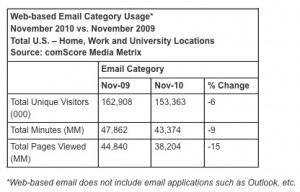
Click to enlarge
Graphic: comScore, Inc.
Emails reach more than 70 percent of the U.S online population each month. And, in November 2010, more than 153 million people visited web-based email providers, according to an online data company. Although email remains one of the most popular online activities are people relying less on web based email systems (that excludes applications like Outlook and Thunderbird) and more on mobile email?
A November 2010 comScore study indicates that may be happening. The study found the number of visitors to web based email sites declined 6 percent during that month compared to the previous year. During the same time period, the number of users accessing email via their mobile devices grew 36 percent.
In terms of engagement, the company’s analysts believe overall time spent in the email category declined 9 percent, while total pages viewed dropped 15 percent. Could part of the shift from web based email to mobile email and the level of engagement be the result of higher unemployment nationwide? Is it possible fewer people are accessing emails on the web and surfing online while working because there are fewer people employed?
Although the company’s analysts concluded there was a general change in email related behavior across age groups below 55 they believe young email users between the ages of 12-17 showed the sharpest decline in usage of web based email during the past year. They believe the number of visitors from this age segment declined 24 percent and engagement dropped by half as total minutes fell 48 percent and total pages dropped 53 percent.
There was a greater drop in usage among men; total email minutes for that period dropped 12 percent for men compared to 7 percent for women. On the other hand, use of web based email increase among older adults. Among those 55 to 64 accessing web based email increased 15 percent with similar gains in engagement; users older than 65 experienced gains across all three metrics.
When it came to mobile email in November 2010, 30 percent of all mobile subscribers (70.1 million mobile users, according to their estimates) used a mobile phone to read emails. That was an approximate increase of 36 percent from the previous year, the comScore researchers believe. Adults between 25 and 34 years old were 60 percent more likely to access email than other mobile users; those between the ages of 18-24 were 46 percent more likely to do so than older mobile phone owners. Men were 14 percent more likely to use email on the mobile phones.
ComScore, Inc., a digital measurement company, relied on data from the company’s comScore Media Metrix, which relies on panel-based and website server-based metrics, and MobiLens, a mobile media measurement tool, for the study. The habits of users of mobile devices aged 13 and older were examined in the study.
Posted by Elena del Valle on February 4, 2011
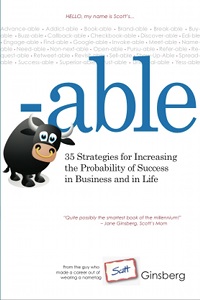
-able book cover
Photos: Scott Ginsberg
Scott Ginsberg, a resident of Saint Louis, Missouri, has been wearing a name tag for ten years in a row. It started out as as a way to teach people how to overcome their shyness and the awkwardness of making the first networking introduction. Along the way, he learned how to be approachable and how to make being approachable profitable.
In his most recent book, -able 35 Strategies for Increasing the Probability of Success in Business and in Life ($19.95), published last year he shares 35 strategies he thinks can help readers increase their probability of success in business and in life. The suggestions are described with sometimes odd seeming phrases such as How to be more findable than a smile at a nudist colony; How to be more referable than an attorney hoped up on sodium pentothal; and How to be more sellable than a case of Coors Light at a Colorado Rockies tailgate party.
Some of the concepts he discusses include the thought that ideas are free and execution is priceless. He believes more is better and advises that readers be “dangerously prolific” and “refuse to slow down long enough for anyone to catch up.” Be fast, produce a lot, push many concepts to fruition and do it consistently, is his advice.

Author Scott Ginsberg
He also believes that not knowing how to do something should not stop readers. Better to move forward than to not move at all; he believes this is true even if you are not sure how or in what direction to move as long as you move. “Otherwise procrastination – the redneck second cousin of patience – will rob you of the motivation you need to carry in the cavalry charge. Finished is the new perfect,” he says.
Ginsberg is the author of twelve books including Hello, my name is Scott, The Power of Approachability, How to be That Guy and Make a Name for Yourself.
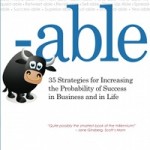
Click to buy -Able
Comments:
Filed Under: Books
Posted by Elena del Valle on February 2, 2011
By Laura Scheiber
Co-author Unequal Fortunes

Laura Scheiber, co-author, Unequal Fortunes
Arthur Levine and I recently wrote a book called Unequal Fortunes: Snapshots from the South Bronx (see Fellowship foundation leader, assistant examine challenges faced by South Bronx youth). It focuses on three Latino teenagers coming of age in one of the poorest neighborhoods in the nation. For ten years Carlos, Leo, and Juan Carlos shared their worlds with us. It was a scary place where kids went to more funerals than graduation parties. Drug dealers were on every corner and gangs ruled the streets. Kids were forced to go to local schools with inadequate resources, under-qualified teachers, and a high staff turnover rate. The outcome was not surprising: half of the children in the neighborhood would never graduate from high school. By 16 years old, Carlos, Leo and Juan Carlos could count on one hand the number of friends who graduated from high school. Their other friends were either working minimum-wage jobs, unemployed, in jail, or dead.
Click here to read the entire article Make the world a better place for you and your family

























